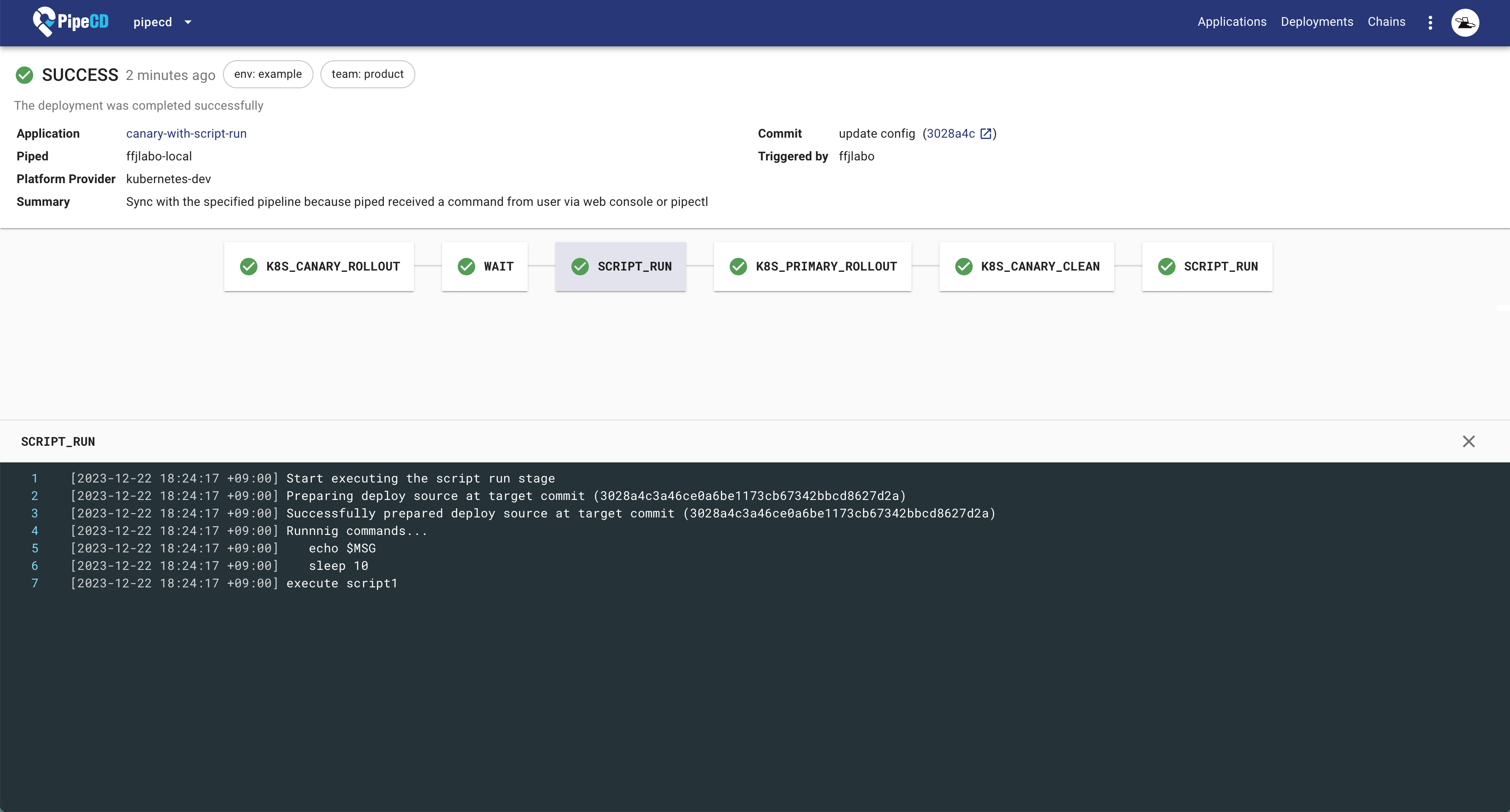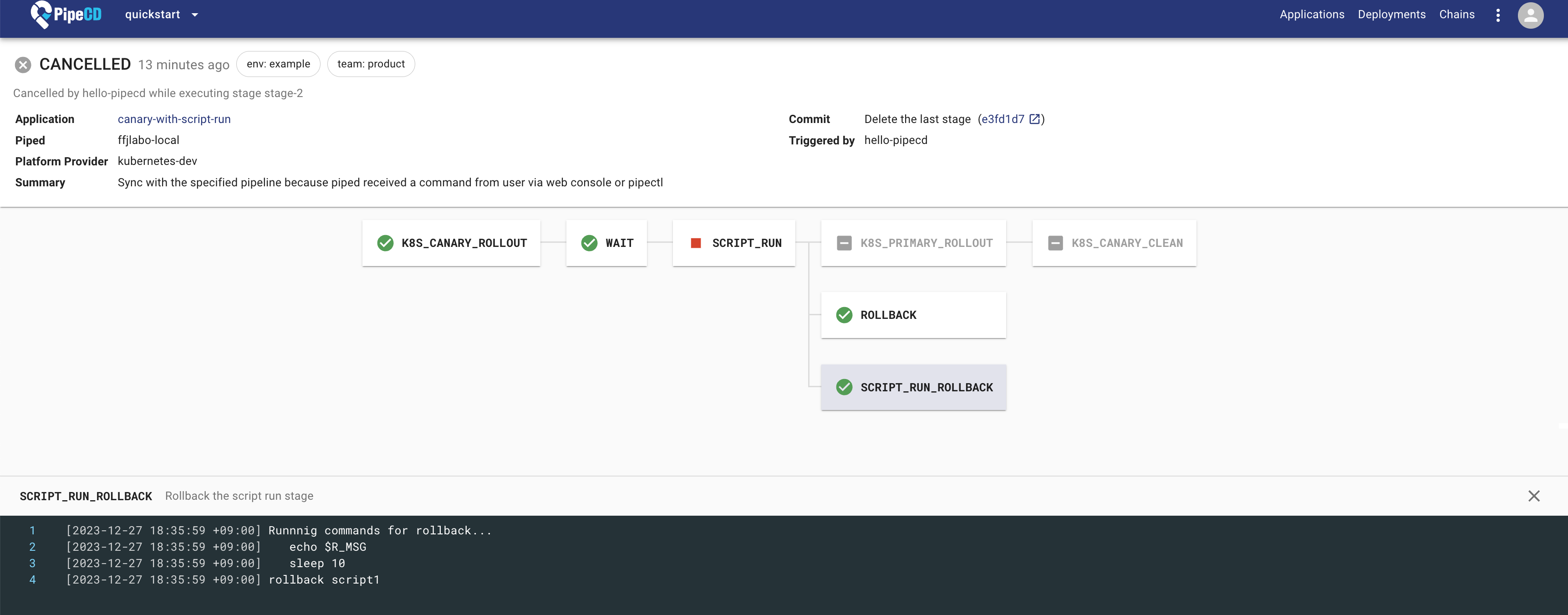Script Run stage
SCRIPT_RUN stage is one stage in the pipeline and you can execute any commands.
Note: This feature is at the alpha status. Currently you can use it on all application kinds, but the rollback feature is only for the application kind of KubernetesApp.
How to configure SCRIPT_RUN stage
Add a SCRIPT_RUN to your pipeline and write commands.
apiVersion: pipecd.dev/v1beta1
kind: KubernetesApp
spec:
name: canary-with-script-run
labels:
env: example
team: product
pipeline:
stages:
- name: K8S_CANARY_ROLLOUT
with:
replicas: 10%
- name: WAIT
with:
duration: 10s
- name: SCRIPT_RUN
with:
env:
MSG: "execute script1"
run: |
echo $MSG
sleep 10
- name: K8S_PRIMARY_ROLLOUT
- name: K8S_CANARY_CLEAN
- name: SCRIPT_RUN
with:
env:
MSG: "execute script2"
run: |
echo $MSG
sleep 10
You can define the command as run.
Also, if you want to some values as variables, you can define them as env.
The commands run in the directory where this application configuration file exists.

Execute the script file
If your script is so long, you can separate the script as a file. You can put the file with the app.pipecd.yaml in the same dir and then you can execute the script like this.
apiVersion: pipecd.dev/v1beta1
kind: KubernetesApp
spec:
name: script-run
pipeline:
stages:
- name: SCRIPT_RUN
with:
run: |
sh script.sh
.
├── app.pipecd.yaml
└── script.sh
Builtin commands
Currently, you can use the commands which are installed in the environment for the piped.
For example, If you are using the container platform and the offcial piped container image, you can use the command below.
- git
- ssh
- jq
- curl
- commands installed by piped in $PIPED_TOOL_DIR (check at runtime)
- built-in commands installed in the base image
The public piped image available in PipeCD main repo (ref: Dockerfile) is based on alpine and only has a few UNIX commands available (ref: piped-base Dockerfile).
If you want to use your commands, you can realize it with either step below.
- Prepare your own environment container image then add piped binary to it.
- Build your own container image based on
ghcr.io/pipe-cd/pipedimage.
Default environment values
You can use the envrionment values related to the deployment.
| Name | Description | Example |
|---|---|---|
| SR_DEPLOYMENT_ID | The deployment id | 877625fc-196a-40f9-b6a9-99decd5494a0 |
| SR_APPLICATION_ID | The application id | 8d7609e0-9ff6-4dc7-a5ac-39660768606a |
| SR_APPLICATION_NAME | The application name | example |
| SR_TRIGGERED_AT | The timestamp when the deployment is triggered | 1719571113 |
| SR_TRIGGERED_COMMIT_HASH | The commit hash that triggered the deployment | 2bf969a3dad043aaf8ae6419943255e49377da0d |
| SR_REPOSITORY_URL | The repository url configured in the piped config | git@github.com:org/repo.git, https://github.com/org/repo |
| SR_SUMMARY | The summary of the deployment | Sync with the specified pipeline because piped received a command from user via web console or pipectl |
| SR_CONTEXT_RAW | The json encoded string of above values | {“deploymentID”:“877625fc-196a-40f9-b6a9-99decd5494a0”,“applicationID”:“8d7609e0-9ff6-4dc7-a5ac-39660768606a”,“applicationName”:“example”,“triggeredAt”:1719571113,“triggeredCommitHash”:“2bf969a3dad043aaf8ae6419943255e49377da0d”,“repositoryURL”:“git@github.com:org/repo.git”,“labels”:{“env”:“example”,“team”:“product”}} |
| SR_LABELS_XXX | The label attached to the deployment. The env name depends on the label name. For example, if a deployment has the labels env:prd and team:server, SR_LABELS_ENV and SR_LABELS_TEAM are registered. |
prd, server |
Use SR_CONTEXT_RAW with jq
You can use jq command to refer to the values from SR_CONTEXT_RAW.
- name: SCRIPT_RUN
with:
run: |
echo "Get deploymentID from SR_CONTEXT_RAW"
echo $SR_CONTEXT_RAW | jq -r '.deploymentID'
sleep 10
onRollback: |
echo "rollback script-run"
Rollback
Note: Currently, this feature is only for the application kind of KubernetesApp.
You can define the command as onRollback to execute when to rollback similar to run.
Execute the command to rollback SCRIPT_RUN to the point where the deployment was canceled or failed.
apiVersion: pipecd.dev/v1beta1
kind: KubernetesApp
spec:
name: canary-with-script-run
labels:
env: example
team: product
pipeline:
stages:
- name: K8S_CANARY_ROLLOUT
with:
replicas: 10%
- name: WAIT
with:
duration: 10s
- name: SCRIPT_RUN
with:
env:
MSG: "execute script1"
R_MSG: "rollback script1"
run: |
echo $MSG
sleep 10
onRollback: |
echo $R_MSG
sleep 10
- name: K8S_PRIMARY_ROLLOUT
- name: K8S_CANARY_CLEAN

The command defined as onRollback is executed as SCRIPT_RUN_ROLLBACK stage after each ROLLBACK stage.
When there are multiple SCRIPT_RUN stages, they are executed in the same order as SCRIPT_RUN on the pipeline. Also, only for the executed SCRIPT_RUNs are rollbacked.
For example, consider when deployment proceeds in the following order from 1 to 7.
1. K8S_CANARY_ROLLOUT
2. WAIT
3. SCRIPT_RUN
4. K8S_PRIMARY_ROLLOUT
5. SCRIPT_RUN
6. K8S_CANARY_CLEAN
7. SCRIPT_RUN
Then
- If 3 is canceled or fails while running, only SCRIPT_RUN of 3 will be rollbacked.
- If 4 is canceled or fails while running, only SCRIPT_RUN of 3 will be rollbacked.
- If 6 is canceled or fails while running, only SCRIPT_RUNs 3 and 5 will be rollbacked. The order of executing is 3 -> 5.
Feedback
Was this page helpful?
Glad to hear it! Please tell us how we can improve.
Sorry to hear that. Please tell us how we can improve.